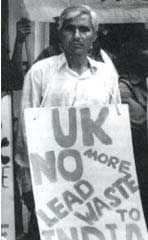No more of waste
 SEVERAL Indian voluntary organisations held a demonstration in front of the ministry of environment and forests (MEF) on April 17, demanding that India ratify the Basel convention and stop all imports of hazardous wastes. Greenpeace activists from at least seven countries were present at the demonstration. They later met the minister, Saifuddin Soz, who assured them that India would accept the principles of the Basel convention, and that "India would not accept wastes that were hazardous to its people".
SEVERAL Indian voluntary organisations held a demonstration in front of the ministry of environment and forests (MEF) on April 17, demanding that India ratify the Basel convention and stop all imports of hazardous wastes. Greenpeace activists from at least seven countries were present at the demonstration. They later met the minister, Saifuddin Soz, who assured them that India would accept the principles of the Basel convention, and that "India would not accept wastes that were hazardous to its people".
According to Nityanand Jayaraman, an Indian Greenpeace activist, the minister had assured them that they would be consulted when the MEF drew up a list of what substances constituted hazardous wastes. "The MEF has a committee which is examining the various waste imports. Based on the recommendations of this committee, India will decide which wastes are hazardous and which wastes are recyclables. Being assured a chance to be a part of the process, would appear to be a good start for us," says Jayraman.
The Indian voluntary groups, which organised the demonstration, have formed a core group, the Basel Action Network (BAN). This watchdog group has been set up to monitor India's stand in the Basel convention negotiations and also the wastes India lists as hazardous. There are several cases pending before the courts, with two Delhi High Court orders banning the imports of lead and zinc wastes.
The Basel ban, which was endorsed by all parties in September 1995, stands as an impressive legal landmark. For long, unscrupulous business interests in rich nations have exploited the less stringent regulations and weak infrastructure in poor countries to avoid the responsibility of minimising their wastes at home. The Basel ban is the developing world's answer to this disturbing trend.
Related Content
- Status report of Punjab Pollution Control Board regarding pollution of Buddha nallah, Ludhiana, Punjab, 22/04/2024
- Report on behalf of Pune Municipal Corporation (PMC) on the use of enzyme Draynzyme to clean waterbodies, 04/04/2024
- People vs plastic: global support for a strong plastics treaty
- Food waste index report 2024
- Behavior change in solid waste management: a compendium of cases
- Order of the National Green Tribunal regarding chemical waste of 337 metric tons lying the Union Carbide campus contaminating groundwater, 20/03/2024
